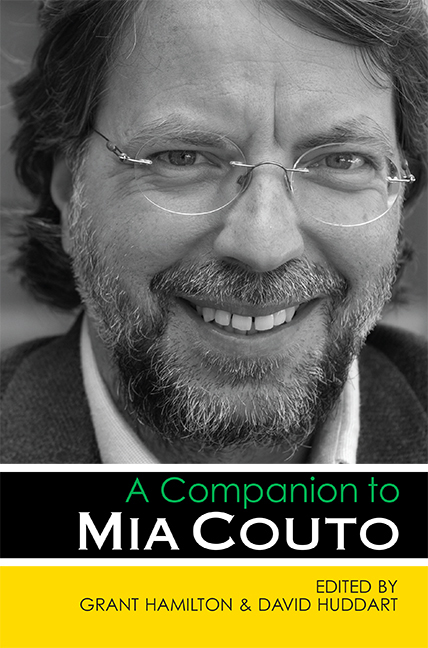Book contents
- Frontmatter
- Dedication
- Contents
- Acknowledgements
- Notes on Contributors
- Introduction
- An Interview with Mia Couto
- 1 Mia Couto in Context
- 2 Uma coisa fraterna Mia Couto & the Mutumbela Gogo Theater Group
- 3 Reading Raiz de orvalho Counterpointing Literary Genres in the Work of Mia Couto
- 4 Spaces of Magic Mia Couto’s Relational Practices
- 5 Mia Couto or the Art of Storytelling
- 6 The Multiple Worlds of Mia Couto
- 7 ‘Ask Life’ Animism & the Metaphysical Detective
- 8 Mia Couto & Translation
- 9 Jesusalém Empty Fathers & Women’s Texts
- 10 Trauma Repetition & Pure Repetition in The Tuner of Silences
- 11 Seeing Like a Crocodile Bird Mia Couto’s The Last Flight of the Flamingo
- 12 Mia Couto & Nostalgia Reading The Last Flight of the Flamingo
- 13 Mia Couto, Contexts & Issues A Bibliographic Essay
- Bibliography
- Index
11 - Seeing Like a Crocodile Bird Mia Couto’s The Last Flight of the Flamingo
Published online by Cambridge University Press: 22 May 2021
- Frontmatter
- Dedication
- Contents
- Acknowledgements
- Notes on Contributors
- Introduction
- An Interview with Mia Couto
- 1 Mia Couto in Context
- 2 Uma coisa fraterna Mia Couto & the Mutumbela Gogo Theater Group
- 3 Reading Raiz de orvalho Counterpointing Literary Genres in the Work of Mia Couto
- 4 Spaces of Magic Mia Couto’s Relational Practices
- 5 Mia Couto or the Art of Storytelling
- 6 The Multiple Worlds of Mia Couto
- 7 ‘Ask Life’ Animism & the Metaphysical Detective
- 8 Mia Couto & Translation
- 9 Jesusalém Empty Fathers & Women’s Texts
- 10 Trauma Repetition & Pure Repetition in The Tuner of Silences
- 11 Seeing Like a Crocodile Bird Mia Couto’s The Last Flight of the Flamingo
- 12 Mia Couto & Nostalgia Reading The Last Flight of the Flamingo
- 13 Mia Couto, Contexts & Issues A Bibliographic Essay
- Bibliography
- Index
Summary
The Last Flight of the Flamingo (2004) begins with an untruth. In his preface, the narrator, the unnamed ‘translator of Tizangara’, writes:
It all began with them, the blue helmets. They exploded. Yes, that's what happened to those soldiers. They quite simply started to explode […] Now, let me ask you this: did they really and truly explode? That's what they call it for lack of a verb. For an exploded man will always leave some residue of his substance. But in this case, there was nothing left at all. (Couto 2004b)
The ‘it’ that all began with the residue-less explosions of the UN peacekeeping soldiers is the arrival of a delegation headed by the Italian Massimo Risi, who comes to the Mozambican village of Tizangara to investigate these mysterious explosions. And, in this sense, The Last Flight of the Flamingo is a detective novel, even if a frustrated one. If the genre demands that a detective search for the residues of a crime, then the translator's prefatory claim – that an ‘exploded man will always leave some residue of his substance’ – is striking. First, because it establishes the translator as someone who knows something about exploded men. But the translator's claim is also striking because it's not entirely true: although the exploded men leave no blood or guts or fragments of bone, their penises remain, the only residue of their existence.
It does not take long for this untruth to be revealed. The translator begins the first chapter of his tale, ‘To put it rudely and crudely, here's what happened: a severed penis was found right there on the trunk road just outside of Tizangara. A large organ on the loose’ (2004b, 1). Very quickly, someone in the gathering crowd solves the mysterious origin of the organ, seeing the emblematic blue helmet hanging on a tree branch above. When the UN delegation arrives, they call in – as the UN is wont to do – a local expert, in this case a woman who ‘exhibited too much flesh and not enough dress’, the town's prostitute, Anna Godwilling (2004b, 14). She identifies the dismembered member as definitively foreign, and so the UN minister assigns Risi the task of investigating how the soldiers have exploded with (almost) no residual remains.
- Type
- Chapter
- Information
- A Companion to Mia Couto , pp. 188 - 202Publisher: Boydell & BrewerPrint publication year: 2016



